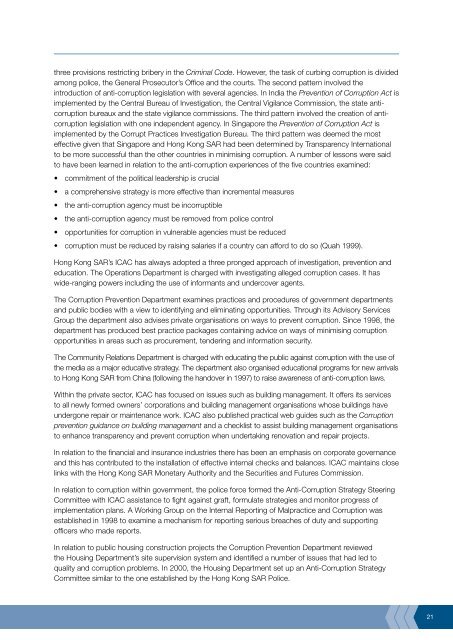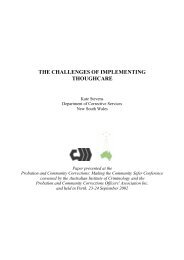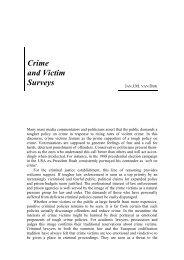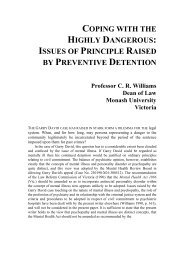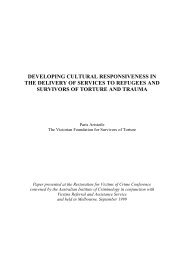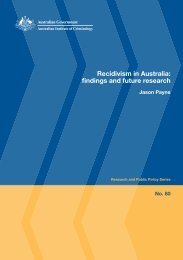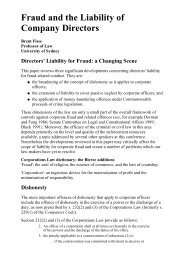Review of anti-corruption strategies Rob McCusker - Australian ...
Review of anti-corruption strategies Rob McCusker - Australian ...
Review of anti-corruption strategies Rob McCusker - Australian ...
Create successful ePaper yourself
Turn your PDF publications into a flip-book with our unique Google optimized e-Paper software.
three provisions restricting bribery in the Criminal Code. However, the task <strong>of</strong> curbing <strong>corruption</strong> is divided<br />
among police, the General Prosecutor’s Office and the courts. The second pattern involved the<br />
introduction <strong>of</strong> <strong>anti</strong>-<strong>corruption</strong> legislation with several agencies. In India the Prevention <strong>of</strong> Corruption Act is<br />
implemented by the Central Bureau <strong>of</strong> Investigation, the Central Vigilance Commission, the state <strong>anti</strong><strong>corruption</strong><br />
bureaux and the state vigilance commissions. The third pattern involved the creation <strong>of</strong> <strong>anti</strong><strong>corruption</strong><br />
legislation with one independent agency. In Singapore the Prevention <strong>of</strong> Corruption Act is<br />
implemented by the Corrupt Practices Investigation Bureau. The third pattern was deemed the most<br />
effective given that Singapore and Hong Kong SAR had been determined by Transparency International<br />
to be more successful than the other countries in minimising <strong>corruption</strong>. A number <strong>of</strong> lessons were said<br />
to have been learned in relation to the <strong>anti</strong>-<strong>corruption</strong> experiences <strong>of</strong> the five countries examined:<br />
•<br />
•<br />
•<br />
•<br />
•<br />
•<br />
commitment <strong>of</strong> the political leadership is crucial<br />
a comprehensive strategy is more effective than incremental measures<br />
the <strong>anti</strong>-<strong>corruption</strong> agency must be incorruptible<br />
the <strong>anti</strong>-<strong>corruption</strong> agency must be removed from police control<br />
opportunities for <strong>corruption</strong> in vulnerable agencies must be reduced<br />
<strong>corruption</strong> must be reduced by raising salaries if a country can afford to do so (Quah 1999).<br />
Hong Kong SAR’s ICAC has always adopted a three pronged approach <strong>of</strong> investigation, prevention and<br />
education. The Operations Department is charged with investigating alleged <strong>corruption</strong> cases. It has<br />
wide-ranging powers including the use <strong>of</strong> informants and undercover agents.<br />
The Corruption Prevention Department examines practices and procedures <strong>of</strong> government departments<br />
and public bodies with a view to identifying and eliminating opportunities. Through its Advisory Services<br />
Group the department also advises private organisations on ways to prevent <strong>corruption</strong>. Since 1998, the<br />
department has produced best practice packages containing advice on ways <strong>of</strong> minimising <strong>corruption</strong><br />
opportunities in areas such as procurement, tendering and information security.<br />
The Community Relations Department is charged with educating the public against <strong>corruption</strong> with the use <strong>of</strong><br />
the media as a major educative strategy. The department also organised educational programs for new arrivals<br />
to Hong Kong SAR from China (following the handover in 1997) to raise awareness <strong>of</strong> <strong>anti</strong>-<strong>corruption</strong> laws.<br />
Within the private sector, ICAC has focused on issues such as building management. It <strong>of</strong>fers its services<br />
to all newly formed owners’ corporations and building management organisations whose buildings have<br />
undergone repair or maintenance work. ICAC also published practical web guides such as the Corruption<br />
prevention guidance on building management and a checklist to assist building management organisations<br />
to enhance transparency and prevent <strong>corruption</strong> when undertaking renovation and repair projects.<br />
In relation to the financial and insurance industries there has been an emphasis on corporate governance<br />
and this has contributed to the installation <strong>of</strong> effective internal checks and balances. ICAC maintains close<br />
links with the Hong Kong SAR Monetary Authority and the Securities and Futures Commission.<br />
In relation to <strong>corruption</strong> within government, the police force formed the Anti-Corruption Strategy Steering<br />
Committee with ICAC assistance to fight against graft, formulate <strong>strategies</strong> and monitor progress <strong>of</strong><br />
implementation plans. A Working Group on the Internal Reporting <strong>of</strong> Malpractice and Corruption was<br />
established in 1998 to examine a mechanism for reporting serious breaches <strong>of</strong> duty and supporting<br />
<strong>of</strong>ficers who made reports.<br />
In relation to public housing construction projects the Corruption Prevention Department reviewed<br />
the Housing Department’s site supervision system and identified a number <strong>of</strong> issues that had led to<br />
quality and <strong>corruption</strong> problems. In 2000, the Housing Department set up an Anti-Corruption Strategy<br />
Committee similar to the one established by the Hong Kong SAR Police.


